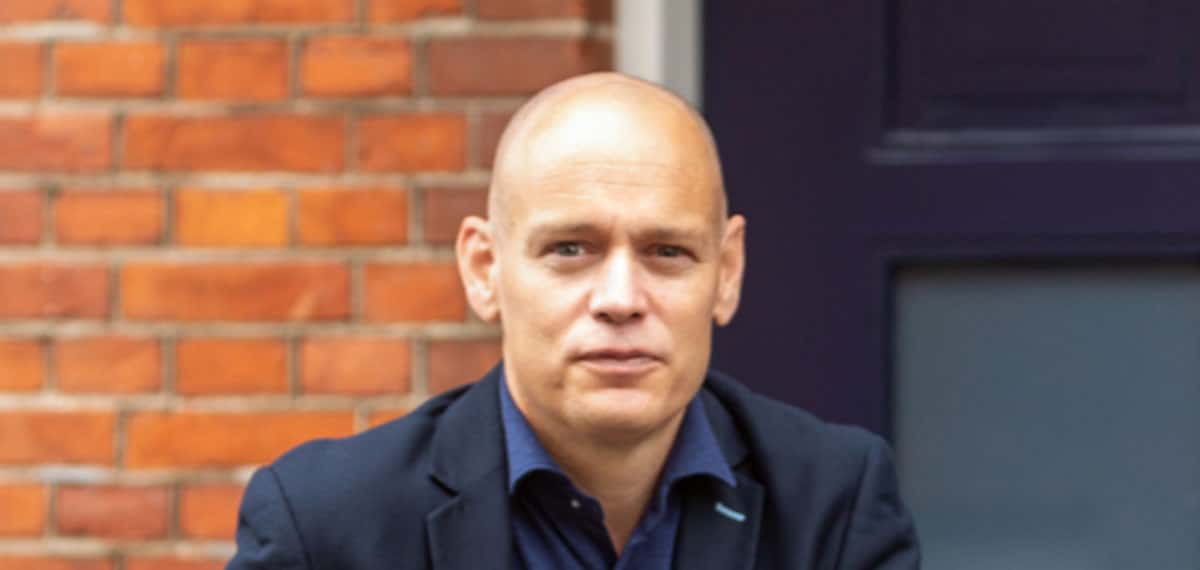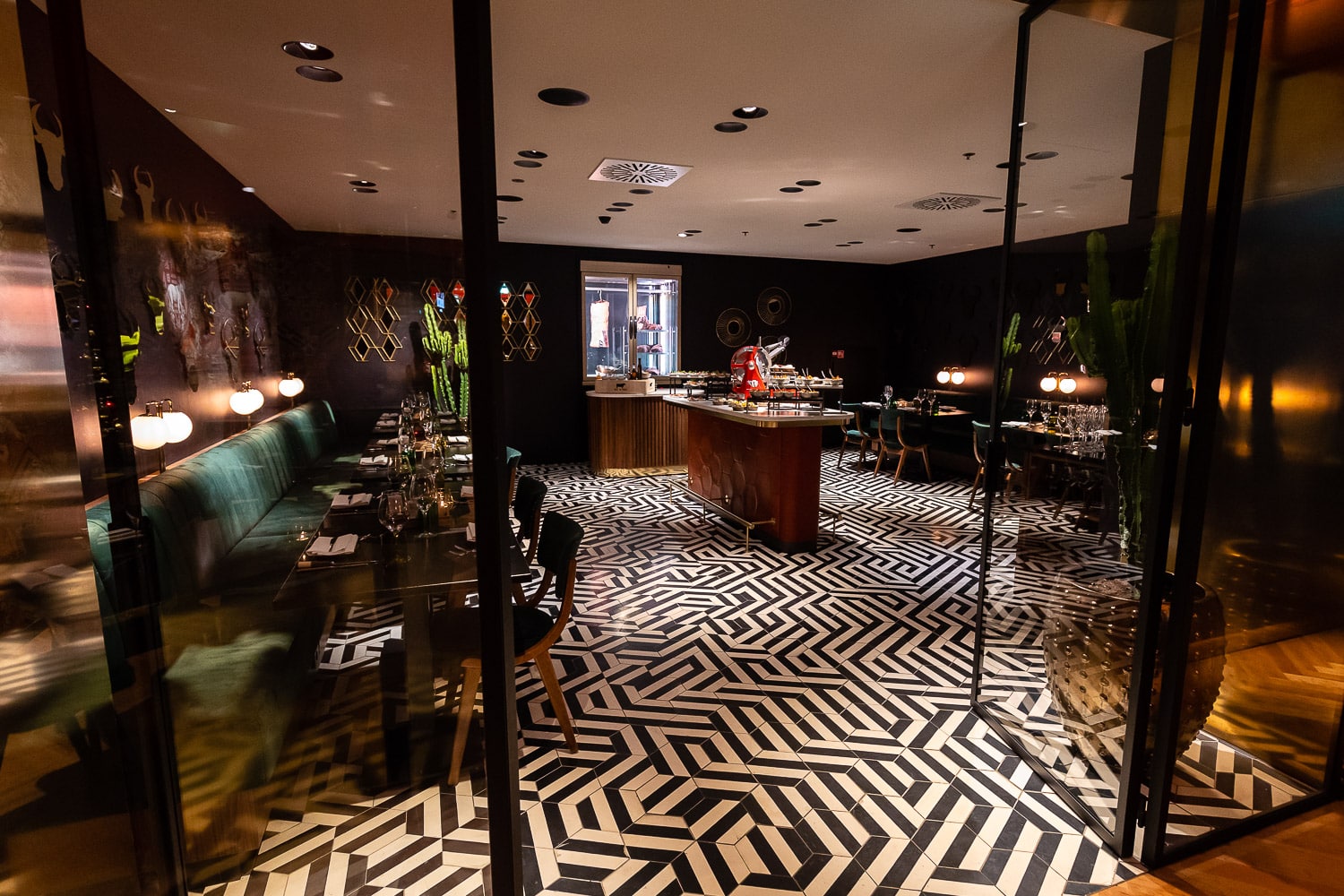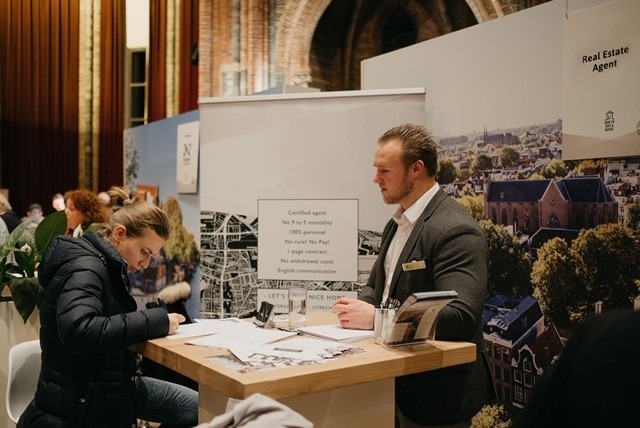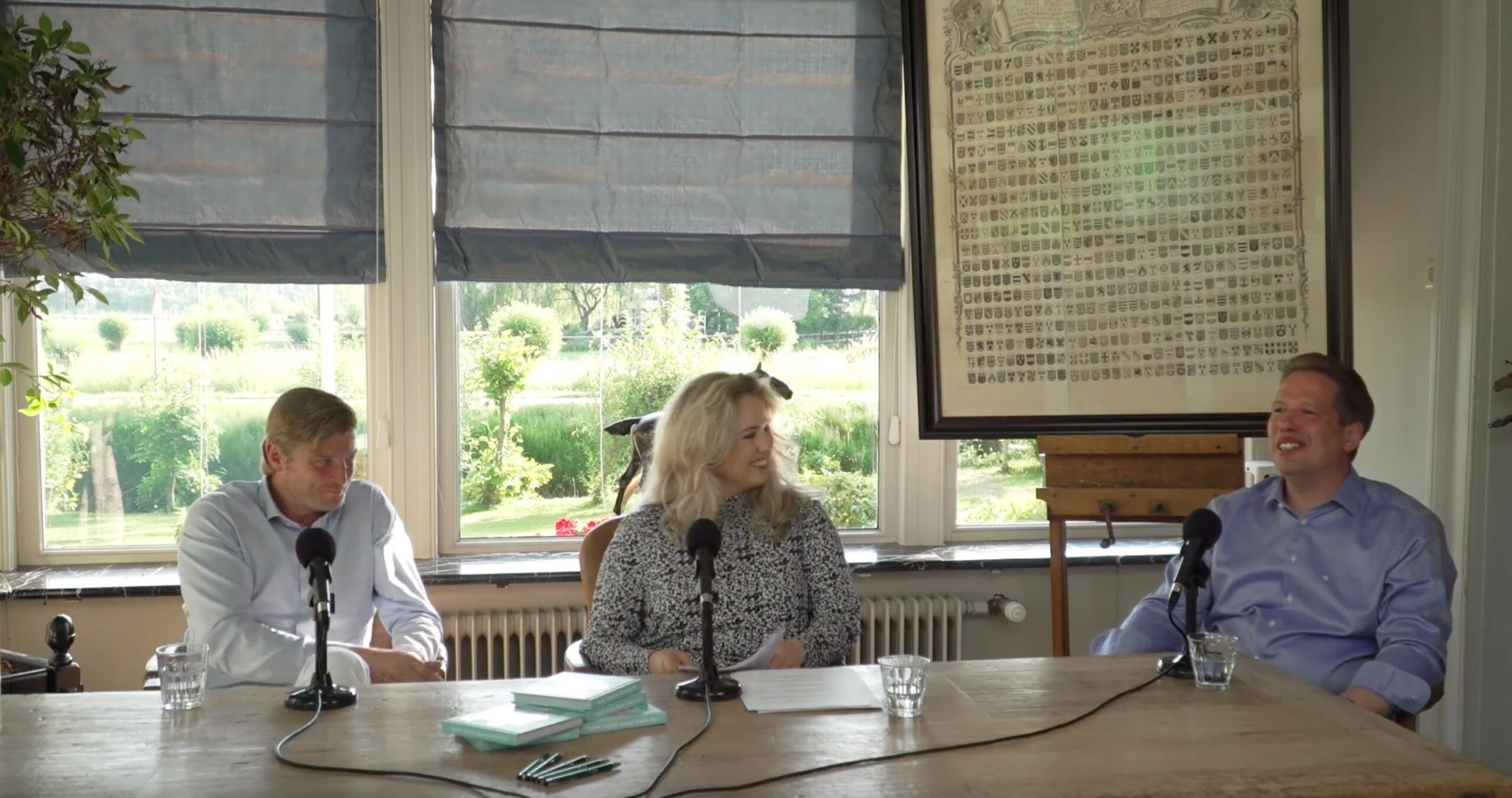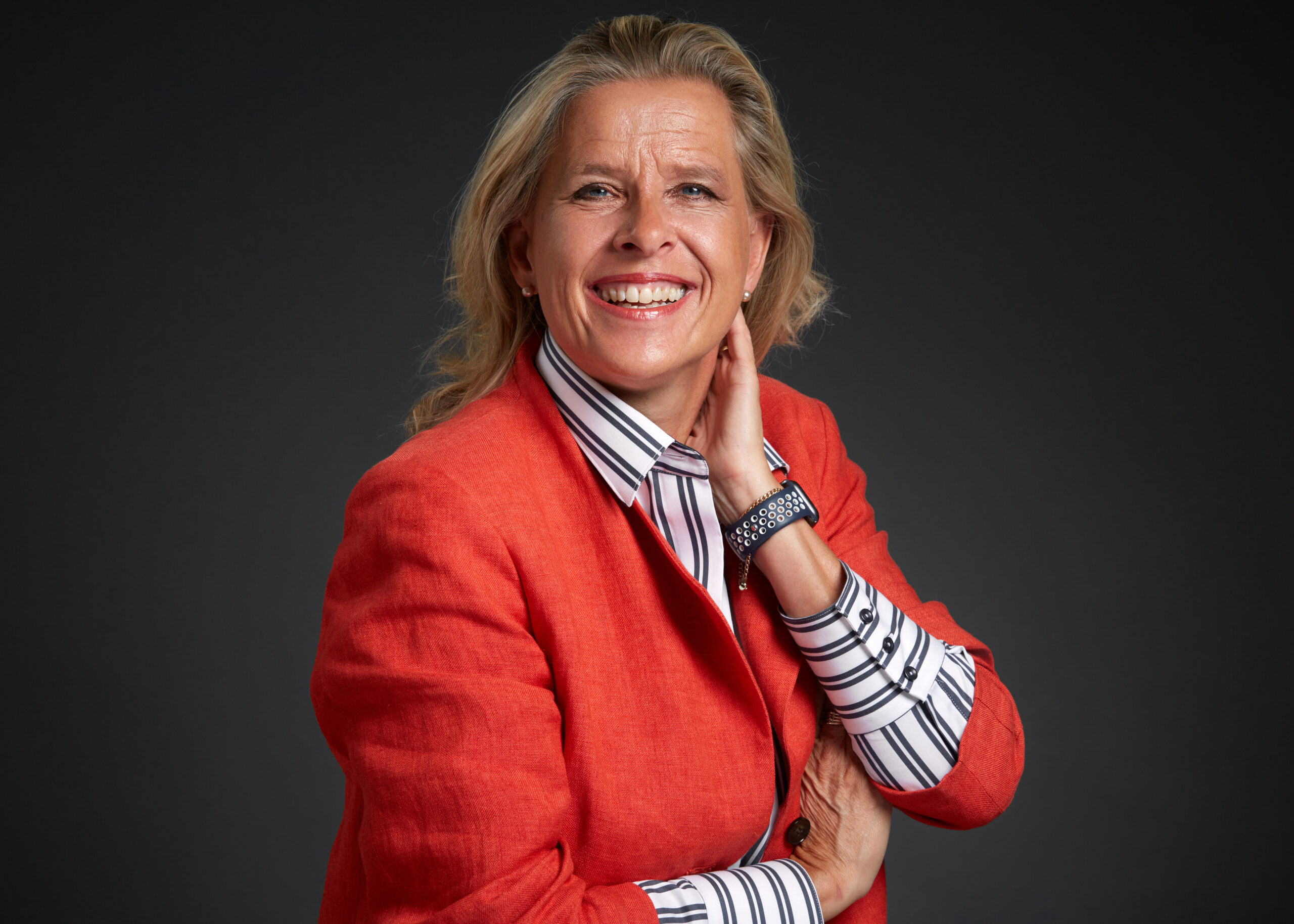Insights from a rising star in real estate, Maud Osinga!
Introducing Maud Osinga, a rising star in the world of real estate and a junior agent at Lauteslager Makelaars Utrecht. As part of one of the largest offices in Utrecht, Lauteslager boasts a team of experts, each bringing their unique expertise to the table.
We are pleased that Maud has given us some insights into the Utrecht real estate market. Our conversation was so packed with valuable information that we've distilled it into 2 informative articles. Stay tuned as Maud shares her expertise, guiding you through the nuances of buying a home, and making your journey to homeownership smoother and more informed. Prepare for Part 1!
Who is Maud?
I am a graduated Assistant agent, a.k.a. Makelaar! As an Assistant Real Estate Agent, my responsibilities are diverse and very exciting. I assist our clients in one of the most significant decisions of their lives – buying or selling their homes. Whether it's conducting property research, coordinating viewings, or handling paperwork, every day presents new challenges and opportunities for me to learn and grow.
What is the customer journey like when buying a house in the Netherlands?
It all starts with a budget, so you must know your numbers. At the beginning of your house-hunting journey, it is advisable to consult with a good mortgage advisor so you have a realistic picture of what is possible within your budget. If all is clear, we can get to the first step:
- Defining your housing needs: You must have a realistic picture of what is possible within your budget in different districts or villages.
- Making appointments: When you find a property that meets your criteria, you can contact the selling office to schedule a viewing appointment. Go and see what is on market!
- Giving purchase advice (optional): If you find a house that captures your interest, a purchase agent like myself will offer buying advice. This advice assesses the structural condition of the house, provides an estimate of its real value based on nearby sales transactions, and considers environmental factors that may impact its (future) value.
- Putting in an offer: Working with a purchase agent, you'll determine the opening proposal amount and any conditions. Common reservations include financing, further technical inspections, potential soil contamination, research on the property's destination and surroundings, and any obligations to the municipality. Additionally, a proposed transfer date will be suggested.
- Taking care of the administrative processing: Once your offer has been accepted, the verbal agreements are documented in the purchase agreement, and the various attached legal documents are thoroughly examined. A purchase agent will ensure that you have all necessary documents, and they are checked properly. If everything is handled well, you will sign the purchase agreement.
- Taking care of a final inspection and going to the notary: The final ownership transfer occurs at the notary's office. Before the notary appointment, a final inspection of the property is conducted to confirm its condition. If everything is satisfactory, you can sign with confidence. If there are discrepancies, they will be addressed before finalizing the transaction.
- If the keys are handed over, you are the owner of the home, congratulations! Now it is time to relax and enjoy your new home!
What is the benefit of hiring a good real estate agent when buying a house in Utrecht?
Well, first: Expertise and Experience! A purchase agent possesses extensive knowledge of the real estate market, local prices, and trends. Their experience enables them to make realistic assessments and guide you in making well-informed decisions. Second: Negotiation Skills! A purchase agent is very important when starting a negotiation. They can get the best possible price on your behalf and secure favourable terms, potentially saving you money. Also, with Access to Exclusive Information pre-market, we can save you time, we are objective, we know the local market and we have a huge network of professionals around us. Last but not least: Legal Protection! A purchase agent understands the legal aspects of real estate transactions. They can advise you on contracts, clauses, and other legal matters, providing better protection.
What is the bidding process like?
The process of selling a house typically involves setting an initial asking price, listing the property, receiving offers from interested buyers, and engaging in negotiations. The negotiation phase may include counteroffers until both parties agree on the terms of the sale. Upon acceptance of an offer, due diligence and inspections may occur, potentially leading to further negotiations. The sale is finalized through the completion of paperwork, and the closing involves the legal transfer of ownership and the exchange of funds. Specifics can vary, and the assistance of a real estate professional is often valuable in navigating the process.
I need a mortgage so I need a valuation - can you explain in simple terms what a valuation is and why do I need one?
A bank requests a valuation report as part of the mortgage approval process. This report provides the bank with independent information on the current market value of the real estate serving as collateral. It enables the bank to assess collateral risk, determine the loan amount, comply with regulatory requirements, and ensure protection for both the borrower and the bank. In summary, the valuation report is an essential tool for risk management and property valuation in real estate financing.
Can every company evaluate my house?
No. A valuation report can be conducted by certified valuators affiliated with a recognized appraisal institute, such as the NWWI (Dutch Property Value Institute). These valuators have the necessary training and certification to provide an accurate estimate of a property's value following prevailing standards. Additionally, in some cases, desktop appraisals are utilized. A desktop appraisal involves assessing the property's value based on available data and information, without the appraiser physically visiting the location. This method is often employed for relatively straightforward appraisals or refinancing purposes.
In the case of the NWWI, this institute ensures the validation and verification of appraisal reports to guarantee quality and objectivity. It's important to emphasize that conducting an appraisal is a specialized task that should be carried out by qualified professionals.
Is it mandatory to evaluate my house? Why/why not?
Property evaluation or appraisal is not mandatory in all situations, but it is commonly required or recommended under specific circumstances. These include obtaining a mortgage for home purchase, determining an asking price when selling or buying a home, refinancing a mortgage, estate planning, insurance purposes, and property tax assessments by local authorities.
What are the consequences if the valuation does not meet the purchase price?
If a discrepancy does occur, for instance, if the appraisal is lower than the purchase amount, it may be necessary to compensate for the difference with personal funds. In that case, you may need to inject additional financial resources on top of the mortgage financing to complete the transaction.
Would you like to include anything else?
Yes, very much ;) At Lauteslager Makelaars, it's not just about homes, it's about the connection! Our real estate agents are known for their professionalism with a touch of warmth. A good relationship with your real estate agent is crucial because, let's face it, choosing a home is not an everyday affair.
Ready to delve deeper into the world of home buying with Maud Osinga? If you're eager to connect or seek further guidance, a single phone call is all it takes to schedule a meeting with Maud. Stay tuned for our next instalment next week, where we'll unveil even more invaluable tips and tricks to empower your home-buying journey.
Bank Clerk's Journey to Mortgage Expert: Transforming Lives through Financial Coaching
Welcome to the inspiring world of Monique Hypotheekadvies, where finance meets transformation! Meet Monique Kamphorst, a visionary in the realm of mortgage advisory services. Beyond her impressive professional expertise, Monique's charm and warmth make her a standout personality in the industry. Her journey, from a Bank Clerk to a distinguished Finance Expert, reflects a commitment to excellence and a passion for empowering others. In an exciting development, she has recently expanded her company's horizons by introducing new loan options for businesses in collaboration with 2 other companies.
Join us in this article to learn about Monique's amazing story. We'll take a closer look at the important moments that shaped her career and how she's making a big difference in the lives of individuals and families.
Could you share a bit about yourself and what led you into the world of finance, particularly your journey in mortgage advice and financial coaching?
I'm a multitasking mom, sister, daughter, and entrepreneur, intrigued by people. Cooking, eating, and the occasional sport keep me going.
My journey in finance began in '83 as a bank clerk. Climbing from the first female bank manager to a private wealth manager, I've spent 12 years self-employed in mortgage advice and financial coaching. Mortgages to me are about life and emotion—where living meets finance. Crafting advice that truly fits my client's needs, considering everything from their mortgage to future scenarios like disability or retirement, is my passion. It's not just about interest rates; it's about securing your life. Every time I give sound advice or number-crunch with a client, it's a genuine thrill. It's where my creativity thrives, piecing together the best deals.
Additionally, how has your transition from 't Gooi to Amsterdam shaped your approach to serving clients in the financial realm?
Shifting from 't Gooi to Amsterdam in 2017 brought a change in clientele—now mostly young compared to me! Yet, the shift brings excitement, especially working with expats and navigating unique issues like ground lease, prevalent in this vibrant city. Amsterdam's been a great move, adding a new dimension to my work!
Let's dive into it! What's the process for calculating the maximum mortgage in the Netherlands, particularly for expatriates?
The calculation of mortgages remains consistent for both expatriates and native-born individuals in the Netherlands. The maximum mortgage primarily hinges on income, and existing debts, and additionally considers interest rate maturity, the property's energy label, and its value. This calculation has grown intricate, surpassing the scope of online tools. However, for expatriates, certain lenders may incorporate the 30% ruling as an added benefit, potentially resulting in a slightly higher maximum mortgage.
Are expatriates generally eligible for mortgages in the Netherlands, and are there specific criteria they need to meet?
Yes. Importantly, in basic terms, one must live and work in the Netherlands.
Do applicants need a stable job to secure a mortgage, especially expatriates or newcomers?
If you have a temporary job and your employer gives you a letter saying they intend to keep you, that income can be used for calculations.
Is there a pre-approval process for mortgages in the Netherlands before starting the house-hunting process?
No, the lender makes the final decision. They have all the documents needed to decide. To make a secure offer, a financial adviser and a real estate agent must work together early on. This helps assess everything and avoid risks before making an offer.
How is the borrowing capacity determined for a mortgage, particularly for expatriates or those with unique employment situations?
The calculation is usually the same for everyone. But if there are special situations that don't fit the usual way, as a financial adviser, I can check if a lender might make exceptions. It's personalised and there's no standard answer due to various factors. If you think this might apply to you, let's talk in an initial free meeting. I can give you a good idea of what to expect.
What documents are typically needed when applying for a mortgage in the Netherlands?
Normally, you'll need a copy of your passport, residence permit, employer's statement, salary slip, and bank statements. Also, you'll require a purchase contract and property valuation report. For business income, the lender might need the company's yearly accounts and the entrepreneur's tax returns from the last 3 years.The lender can ask for more papers if things aren't clear. I suggest gathering as many documents as you can early on to speed up the mortgage process. I'll assist in collecting them too.
Can you explain what the 30% ruling is and how it affects expatriates or highly skilled migrants in the Netherlands?
The 30% rule applies to non-Dutch employees working temporarily in the Netherlands. If they meet its conditions, they won't be taxed on up to 30% of their wages. This method allows the government to reimburse them for the additional expenses they face to work in the Netherlands.
Have any recent changes in the 30% ruling impacted individuals benefiting from this tax advantage?
Foreign employees are exempt from taxes on up to 30% of their earnings, provided they meet certain criteria. Starting from January 1, 2019, this 30% rule is limited to 5 years. Nevertheless, a transitional arrangement was in place until 2021.
The 30% rule for employees with specific expertise recruited from abroad will be further scaled down from 1 January 2024 if the Senate also agrees to the bill.
If I want to rent out my home, does that impact my mortgage contract, and are there specific considerations or exemptions?
It's important to ask the lender first. Mortgages differ based on whether it's for a rental property or your home, with different rules and rates.
If I want to buy a second home, can I utilise the same mortgage and increase the amount, or are there different terms for multiple properties under one mortgage?
When you move homes and live in a new place, you can usually transfer the interest terms from the old house. The old house will typically need refinancing, often becoming a rental mortgage because you can only live in one house at a time.
Can I use my existing mortgage to purchase a home for my children?
If your home holds significant additional value and your lender permits, you can increase your mortgage. Contact a financial adviser to assess if this aligns with your best interests. Naturally, your income should comfortably cover the expanded mortgage amount.
In the event of a divorce, how does this affect the existing mortgage?
Divorce doesn't make anyone wealthier; it means supporting two households instead of one. It's important to see if one person can handle the mortgage and buy out the other if the house has extra value. Get help from a financial adviser early on for this. Working with a divorce mediator and financial adviser can be really helpful in this situation.
Are there any specific insurance policies required by the mortgage lender, and what types of insurance might be necessary?
The majority of lenders don't mandate disability or death insurance. However, insuring the home is crucial because it serves as security for the lender.
Could you detail the range of services you offer as a mortgage advisor? What specific assistance or guidance can clients expect throughout the mortgage process when working with you?
I offer a free first meeting to discuss your mortgage. If you choose to work with me, I'll guide you through the entire process until you own your new home.
You'll only deal with me, and I'm available whenever you need me, even on weekends or evenings. I'll help with paperwork, find the best deals, and ensure everything is in place. My fee is €2,250 for your first property and €2,595 for subsequent ones. Afterwards, I'll check in with you yearly to make sure everything's going smoothly, at no extra cost.
For those eager to explore personalized financial solutions or discuss their homeownership goals, Monique welcomes appointments. To schedule an appointment, reach out to Monique at info@moniquehypotheekadvies.nl
The Key to Insurance Success
Meet Sander Schreve, a senior insurance agent dedicated to assisting expats, whose journey began in 1999 with the esteemed insurer, Nationale Nederlanden. Over the years, Sander has accumulated a wealth of knowledge and unwavering commitment to safeguarding what matters most to his clients.
Sander offers insights into the mandatory insurance landscape in the Netherlands. We've asked him about the required insurances and the key to insurance succes in the Netherlands. Here's what he has to say:
Mandatory Insurance in the Netherlands:
- Health Insurance in the Netherlands is an essential requirement for everyone. It ensures that you have access to high-quality healthcare services when you need them the most. The best part is that you have the freedom to choose from a range of providers, allowing you to customize a plan that suits your individual needs.
It's important to note that you have the option to switch insurance companies every year on January 1st. However, please keep in mind that switching may require a health declaration. To make the right decision, it's crucial to do thorough research and select a policy that aligns with your specific healthcare requirements.
We also have some great news for our English-speaking clients! We have a special arrangement with health insurer ONVZ, which offers an additional discount. ONVZ is one of the top Dutch health insurers, providing excellent coverage and peace of mind.So, when it comes to health insurance in the Netherlands, make sure to choose wisely and secure the best coverage for yourself and your loved ones. Stay healthy and protected! - Liability Insurance for Cars:
If you own a car in the Netherlands, it is a legal requirement to have liability insurance, also known as "WA-verzekering."This insurance policy covers any damage you may cause to others in an accident, promoting responsible driving on Dutch roads.
It's important to note that there are significant premium variations among insurers. However, we can provide you with options from multiple insurers, guaranteeing you a competitive premium. So, drive safely and confidently knowing that you're protected! - Home Insurance (Opstalverzekering):
Owning a home in the Netherlands often requires having home insurance, a mandate set by banks if you need a mortgage. This insurance provides peace of mind and safeguards your investment.
To secure the most suitable coverage for your circumstances, seek professional guidance. While these are mandatory insurances, there are additional options available to cover your health, wealth, and assets. Policies we often advise people to consider include personal liability insurance, life insurance, travel insurances and legal assistance insurance.
In my daily practice, I encounter numerous individuals unaware of their insurance coverage and their payments. This is often due to the fact that they have policies with multiple different companies.
However, having everything in one place is much more organised and cost-effective due to package discounts!
I can streamline the process and am here to assist you in managing your insurance policies and consolidating them into one place. Moreover, if any damages occur, I will handle all the associated complications. While insurance might not cover everything, I can certainly guide you in the right direction. Just reach out via our website or by phone!
Navigating insurance in the Netherlands is essential. With Sander's expertise, you can protect your life and comply with the law. His experience and friendly approach make him your ideal insurance guide. Sander's website, hoogenraadvanloon.com, is a testament to his commitment to serving expats. It's a user-friendly platform where clients can explore a wide range of insurance options and connect with Sander directly. The website not only offers valuable information but also reflects his passion for ensuring that expats have the insurance coverage they need in their adopted home. Explore hoogenraadvanloon.com to begin your insurance journey with Sander today.
Elevate Your Home Buying Journey by Gaining Insightful Answers to Your Questions!
In this interview, we sit down with Monique Burgemeester the founder of How To Buy A House BV to discuss the exciting changes happening with her events. Monique shares insights into why she decided to make the gatherings more personal and the benefits it brings to our attendees. Unlocking the Future of Home Buying is the title to a new series of tailored events for serious home buyers.
Can you tell us about the event and the significant change you've made in its format from a large and busy gathering to a smaller, more personal setting?
Monique -> Absolutely! The event, "Elevate Your Home Buying Journey," is a special initiative close to my heart. We've transformed the home buyers event from its previous large-scale format into an intimate gathering for several reasons.
Could you elaborate on those reasons?
Monique -> Certainly. We've always valued the quality of interactions over quantity. In a large and busy event, it's challenging for attendees to have meaningful conversations with our experts. By limiting the number of participants to just 25, we can create a much more personalized and engaging atmosphere. We believe that the setting at Midtown Grill perfectly complements our commitment to quality interactions. Picture this: You have the chance to indulge in a delightful meal and engage in relaxed conversations with the relevant experts. It not only saves you time but also provides a comfortable way to gather information about perhaps the most costly purchase in your lifetime. By the end of the event, you'll be equipped with all the knowledge you need. How wonderful is that!
That sounds like a great change. How does this shift benefit attendees?
Monique -> It benefits our attendees in several ways. First, it allows them to have direct access to our 5 senior experts. In a smaller setting, they can ask specific questions related to their unique circumstances. Second, it fosters a sense of community and networking among attendees. Lastly, it ensures that everyone's questions and concerns take centre stage, guaranteeing a more enriching experience.
What motivated you to make this change?
Monique -> Well, the last significant event took place in February 2020, just before the initial lockdown, and it was so hectic that we hardly had the time to ensure everyone received equal attention. We were determined not to repeat this experience.
Additionally, over the years, we've witnessed an increasing demand for personalised guidance in the home-buying process. Buying a home is a substantial decision, and individuals seek tailored advice. In response to this demand, we aimed to craft an event that genuinely places the spotlight on each attendee. Our guiding principle has always been quality over quantity.
That's a thoughtful approach. Can you share any feedback or reactions you've received about this change?
Monique ->We've just wrapped up our inaugural event, and it's safe to say that we've hit the mark! Our attendees highly value the presence of our esteemed experts and are absolutely thrilled to access information tailored to their specific needs. As the evening unfolds, they have the opportunity to engage in even more personalized conversations. It's becoming increasingly evident that this is precisely what people have been seeking but unable to find online—a considerate and thoughtful approach to information sharing.
One noteworthy change is our introduction of an attendance fee. In the past, our events were free, but this model was no longer sustainable. By implementing this fee, we aim to ensure the quality and sustainability of our offerings. It allows us to allocate resources efficiently, ensuring that even if someone can't make it, we can still compensate our contributors, such as the chef.
It sounds like a fantastic transformation. What do you hope attendees will take away from this event?
Monique -> Our primary goal is to empower attendees with the knowledge and confidence they need to make informed decisions about their home purchase. We want them to leave with a sense of clarity and connection. Whether it's finding the right property, understanding mortgage options, or navigating legalities, we aim to equip them with the tools they need for a successful home-buying journey.
That's a noble objective, Monique. Thank you for sharing your insights and the motivation behind this transformation. We wish you all the best with the event.
Monique -> Thank you, it's been a pleasure discussing this with you. With these new events, we are expanding our commitment to your satisfaction, ensuring that you leave with all the knowledge you need to make informed decisions. We look forward to welcoming you to these upcoming events in 2024 at Marriott Hotel Amsterdam, Midtown Grill!
If you need more information, make sure to shoot a message to monique@howtobuya.house
Interview | Anja Kroon, Interior Designer
Today, we have the pleasure of sitting down with the immensely talented Anja Kroon, a renowned interior designer with a wealth of international experience and a background in building and architecture.
Anja, your journey as an interior designer with a background in building and architecture is truly fascinating. Could you share with us how your passion for design and architecture first began?
A Certainly! My fascination with design and architecture ignited during my childhood, where I found myself captivated by the harmony between aesthetics and functionality in the spaces around me. As I grew older, my passion only intensified, leading me to pursue formal education in architecture and design.
That's truly inspiring! How has your architectural background influenced your approach to interior design?
My background in architecture has a big influence on my interior design approach. I see spaces as a whole, considering both their structure and the interior elements that bring them to life. This helps me create designs that not only look beautiful but also make the space practical and easy to move around in.
How does designing for different cultures and regions influence your creative process on international projects?
Designing for different cultures and regions is a wonderful journey. Every culture has its own special style, traditions, and way of living, which I love incorporating into my designs. I take the time to deeply understand my clients' cultural values and dreams through research and close collaboration. This helps me create spaces that truly connect with them on a meaningful level.
Anja, what do you believe sets your interior design style apart from others in the industry?
I love creating spaces that are both elegant and functional. My design style combines timeless elements with contemporary aesthetics, ensuring that the spaces I create stand the test of time. I believe in crafting designs that not only look beautiful but also cater to the practical needs and lifestyles of my clients.
What would you say is the biggest misconception about hiring an interior designer?
Ah! That is a good question! Hiring an interior designer is often misunderstood as an expensive option, reserved only for large-scale home makeovers. However, interior designers are more than willing to assist with smaller refurbishing or restyling projects like bedrooms, kitchens, and living spaces.
In fact, a significant number of inquiries received by our office are for these smaller-scale projects. Our expertise can make a substantial difference in enhancing the appeal and functionality of your home, no matter its size. From optimizing space to suggesting creative storage solutions and introducing colour schemes, we bring fresh ideas and innovative solutions to transform any space.
Moreover, we have access to several skilled building teams and therefore we can often complete projects more efficiently than traditional builders.
Anja, what advice would you give to aspiring interior designers aiming to make a mark in the industry?
For all aspiring interior designers, my advice is to stay curious and keep learning. The design industry is always changing, so staying up-to-date with trends, materials, and technologies is crucial. Find inspiration from different sources and trust your instincts. Remember, creating meaningful spaces requires passion, perseverance, and a deep understanding of your clients' needs. Keep pushing forward and believe in yourself!
Thank you, Anja, for sharing your valuable insights with us! Your words have clarified that interior advice is beneficial for everyone, not just the wealthy. We appreciate your time and expertise in answering our visitors' questions.
We're excited to have you as our special guest at the upcoming Boutique Event in Marriott Hotel. See you soon!
2024 Tax Overhaul for Expats: 30%-Ruling and Non-Resident Tax Rules
Starting January 1, 2024, the 30%-ruling for expatriates in the Netherlands is undergoing a significant overhaul.
The current legislation, which allows expats to benefit from a 30% tax reduction on their income for a maximum period of 5 years (equivalent to 60 months), is undergoing a transformation. Under the new legislation, this generous allowance will be divided into three phases, as follows:
The New Legislation Breakdown:
- First 20 Months (30%-Allowance): During the initial phase, expats will still enjoy a 30% reduction in their taxable income.
- Subsequent 20 Months (20%-Allowance): In the following stage, expats will see a reduction to a 20% allowance.
- Last 20 Months (10%-Allowance): Finally, in the last phase, the tax advantage will further diminish to a 10% allowance.
However, there is good news for expats who are already benefiting from the 30% ruling. The Dutch government protects pre-December 2023 30%-ruling beneficiaries from new regulations with a transitional agreement.
This provision offers a degree of continuity and reassurance to those who have structured their financial plans around the existing rules.
In addition to this alteration, a second significant amendment has been passed: the removal of the option for expats to elect non-resident tax status. This change is set to take effect on January 1, 2025. Historically, choosing non-resident tax status spared expats from paying tax on Box 2 and Box 3 income. This is changing, potentially affecting tax obligations.
A transitional arrangement enables expats using non-resident tax status and the 30% ruling by December 2023 to continue until at least 2026. This grace period acknowledges the need for a smooth transition and allows expats to adapt to the changing tax landscape. These changes require careful planning and adaptation to ensure expats continue to benefit from favourable tax arrangements.
Finally, we note that the 2024 Tax Plan Package, of which these amendments are part, must still be approved by the Senate. If you are in need of some help understanding this matter, we advise you to contact your tax advisor.
We will keep you posted!
Interview | Tim Wormsbecher, Real Estate Agent
We have worked with many colleagues in the real estate industry over the years, and today, we would like to introduce you to Tim Wormsbecher, the proud owner and real estate agent / valuator at TWM Makelaardij .
After working in real estate for nine years, Tim decided to start his own adventure and in 2017, TWM was founded. In the last few years, the company has expanded, with the team now consisting of three real estate agents and two colleagues in the back-office. Notably, Tim's team are most active in the real estate market in Amsterdam, Purmerend and Zaandam.
We reached out to Tim to get an insight into valuation, the housing market in Amsterdam and the best way to approach finding the perfect home in the Netherlands!
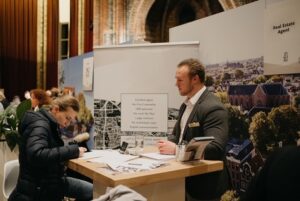
What is the customer journey like when buying a house in the Netherlands?
The market in the Netherlands is quite transparent, the majority of houses is to be found on a central website and they are strict in the regulations the advertisements from realtors have to meet. So, it is fairly easy to orientate from home.
Where do I start in buying a house in the Netherlands?
In most cases, people in the Netherlands live relatively close to where the work, so this will most likely be your preferred area. The Amsterdam region is quite small compared to other international cities. With public transport or by car, 30 minutes can get you in completely different areas with different aspects to keep in mind as well as different populations and regulations.
What is the benefit of hiring a good real estate agent when buying a house in Amsterdam?
We know the market like no other, we estimate the pricing of houses, know what areas or what building eras have, which specific issues or things to watch out for. A huge part of our job is to estimate the value of the house so that you don't overpay; it's never the same percentage that you should offer over an asking price. We even regularly buy houses under the asking price. Thorough investigation is crucial.
Why should I not look for a property by myself?
Although the advertisements are transparent, there are so many rules and regulations when buying a house in the Netherlands. For example, if there is a house with a roof terrace but there was no permission granted, what to do if the homeowners association is not saving enough money for future maintenance, what is a ground lease (leasehold) and how does it affect the value of a house, what is the state of the foundation of the building, what are the costs of a renovation etc. We are aware of all aspects and can answer 99% of your questions right away.
What do I do if I want to sell my house in the Netherlands? What are my options? Is it good to hire a real estate agent in this scenario?
The best is to hire an agent to sell your house, the agent will determine the market value and based on that give advice for the asking price for the advertisement. There will be a professional photographer, floorplans and measurement certificate will be made and the advertisement text will be written by the agent. The house will be put online and the agent guides all the viewers through your house. Your agent will either choose to have a bidding deadline or when an offer comes in the agent will negotiate (in consultation with you) to get the highest price. Your agent will make sure the agreements are legally registered in a purchase agreement and you will also be guided through the rest of the process like signing, inspection and delivery.The entire process is taken care of with nothing to worry about.
If I sell my house, how am I guaranteed the highest bid?
Before starting the process you'll receive advice with the estimated value. Realtors are experts in determining the best price to put the house on the market. In addition, they will make sure the viewers are well informed and get excited to make an offer on your house. With either a bidding procedure or a perfect negotiation we will get you the best price possible.
Does a real estate agent have a pre-market register?
We have an exchange system where realtors put in the newest listings, in general agents are at least one or two days ahead of the main websites. This gives a head start for agent to schedule appointments for their clients and when buying a house it gives you the advantage that you and your agent can be there on the first day of viewings and maybe even buy the house before someone else will even visit the house.
What is the bidding process like?
It differs with every property. In this market most properties are sold with a deadline. Meaning that you have until a certain time to make a one-time offer. If the selling agent has no offers yet, you can make the first offer and see where it lands. If the selling agent receives multiple offers, it can be decided that, in consultation with the seller, there is going to be a deadline still and you have the option to participate in this.
How can my real estate agent help me to negotiate the best possible as a buyer or a seller? Find out what you can afford from mort advisor or bank - explanation.
First we would like to connect you with a mortgage advisor we work with a lot. This way we are very certain that if we make an offer, the buyer can indeed finance it. Before the negotiation, whether it is a deadline or a first offer, we are going to look at the property as an appraiser would. This way we have multiple of the same or similar properties which we can compare to the property the buyer wants to buy. When we are certain of a price, we can advise our buyer not to go over this mentioned price as going over it means the buyer buys it above market value and this is usually not what someone wants. The buyer has always the choice to go over the estimated market value but the buyer needs to know and must be willing to invest their own savings into the purchase of the property.
I need a mortgage so I need a valuation - can you explain in simple terms what a valuation is and why do I need one?
The valuation, also the appraisal report, is a report which is made by a third and independent party who appraises the property. This report goes to the bank / financial advisor so the mortgage process can start. The amount mentioned in the report is also the maximum which will be financed for the purchase of the property. It is also possible to finance a (part of a) renovation.
Can every company value my house?
No, only an appraiser can do so. For a mortgage, it has to be a validated report and only appraisers attached to the union of appraisers may have their reports validated.
Is it mandatory to valuate my house? Why / why not?
If the buyer is in need of a mortgage, yes. If not, it won't be necessary however it is always a good idea to hire an expert in estimating the property value before you make an offer.
What are the consequences if the valuation does not meet the purchase price?
There are two options. In the purchase agreement, it will say the buyer has a certain time to get the mortgage approved. If, in case of a too low amount mentioned in the appraisal report, the buyer hands over a rejection letter from the bank stating they cannot have a mortgage based on the fact the appraisal amount was too low, the buyer can cancel the purchase agreement. It is a choice however, you can always choose to continue, get the lower amount according to the report and add the rest from your own savings.
Do you have any tips on buying or selling in general?
Hire an expert to guide you through the process, this will save a lot of insecurities, answer a lot of questions and most important: a good agent will earn money, not cost money. This works for either a buying agent who protects you from not overpaying and a selling agent who does their best to get the highest price possible for you.
Managing Expectations in the Amsterdam Property Market
When it comes to purchasing your property in the Netherlands, there is a lot you need to be aware of prior to landing your dream home. All is not always as it seems, and there are many pitfalls to be cautious of along the way! Luckily, a good real estate agent can help you to navigate this unfamiliar territory.

In this unusual market, it can be hard to know what kind of property is right for you, as well as what is attainable. A knowledgeable real estate agent will be able to guide you through properties you’re interested in in order to ensure your needs are met personally, financially and holistically - whatever they may be.
An important thing to remember is that although purchasing a property can be a very exciting milestone in your life, it is paramount that you are realistic about the outcome. It is possible that you may be disappointed during the journey to find your home, so try not to get too attached to an idea before it’s a reality.
What is bidding, and how can it affect the purchase process?
A 'bid' means that you're showing interest in purchasing a house - it's more like a gesture, or even a proposal. It is one of the elements of buying a property that needs to be managed with the utmost diligence, mainly because of the uncertainty of the result when the seller opts for a ‘closed bid.’ A closed bid may occur when multiple parties are interested in the property, so the seller decides to give them all the option to submit their best price blind within a limited time frame.
I’ve heard that the value of the property does not always match that presented online… is this true?
A part of managing expectations is that the prices you see first-day do not always align with the actual purchase price. Buying a home is the biggest investment most people will make in their lifetime. Unless you have unlimited funding, you need to be realistic about what it is you can afford because chances are, the price will be higher than what was advertised.
In the Netherlands, the purchase price can vary greatly from what you originally see online. Your real estate agent will guide you through the effects that the valuation process will impact on the property you are interested in.
Making Changes Within the Canal Ring
Something else to consider when buying property in Amsterdam is that if you are hoping to buy within the canal ring, it is a protected area. Since being added to UNESCO’s World Heritage List in 2010, you need to be aware of some restrictions placed on the buildings should you want to make any changes to your home.
The majority of the time, it is not possible to make any changes at all, and if it is, a permit must be approved prior to the alterations. For example, if you’d like to add a rooftop terrace, balcony, or make any changes to a building, you must have a permit known as an integrated environmental permit (omgevingsvergunning).
This permit is often required before you can make changes to the outside of the building, too. Handling these unique challenges can be tricky, however Barry will be able to guide you every step of the way so you can make a confident and informed decision when it comes to purchasing your home. Even if you have permission to make alterations, it is good to consider that this will be costly, which brings to mind the phrase, ‘caveat emptor’ - let the buyer beware!
I’m ready to know more! Where can I find a good real estate agent?
Barry Burgemeester is a Dutch native. Originally hailing from Utrecht, he has worked for over 23 years in real estate in the Amsterdam and his extensive knowledge of the area is uncontested.
Barry’s background and expertise is invaluable to our expat clients, mainly because his wealth of experience within the Dutch market guarantees that he will be able to predict any potential issues or concerns you may have when introduced to this unfamiliar territory. Get in touch at info@burgemeestervastgoed.nl today!
Interview | Anne-Marie Snel, Notary
Who is Anne-Marie Snel?
Anne-Marie Snel is a top-class Notary. Having recently been appointed by the Dutch courts, Anne-Marie is now able to sign her own deeds - a huge milestone in a Notary's career. Her core business is everything to do with property, whether that's ownership, transfer, or closure of houses. While Attorneys are employed to solve problems, in the Netherlands a Notary prevents problems in relation to real estate as an impartial party. Although Anne-Marie finished her studies in 1994 in a different area, she ended up working in a Notary's office where her journey first began. A How To Buy A House (HTBAH) veteran, Anne-Marie with Monique at the first HTBAH event in the Hague during which time Anne-Marie was employed with a bigger firm.
They kept in contact over the years, and Monique has had the pleasure of working with Anne-Marie on several projects since then, often collaborating with and helping expats to find their dream homes.
What exactly is a Notary?
A Notary is basically a legal coordinator when you choose to purchase a home in the Netherlands. A Notary specializes in 3 areas - real estate, family law and corporate law. A Notary is more common in European countries, it's a Latin system. The moment the Notary signs the deed, you don't have to worry, they will arrange everything with the transaction. In English-speaking countries, the solicitor handles all arrangements, but not transactions. Also, a Notary does not go to court.
From a Notary's perspective, what is the customer journey like when buying a house in the Netherlands as an expat?
Once you have partnered with a good real estate agent and have found a property you like, you then need to acquire a Notary to seal the deal from a legal perspective. Because your Notary is an impartial party to the sale, you can have them look at the contract without any cause for concern regarding their intentions. In Amsterdam, the Notary will draw up the contract. Outside of Amsterdam, the seller will sort this out. In the Netherlands, you have to declare that the money you're using to pay for the house has been earned authentically, whether that income is from your salary, business, or other assets. The Dutch government needs to make sure you're not laundering money because the easiest way to do this is through property.
Are there any particular details of the process that I should be aware of?
If you don't speak Dutch, an official translator will need to be present to sign the deeds, for which you must factor into the cost of the entire purchase. In addition, you have to consider which laws apply to your possessions as a resident of the Netherlands, eg which tax laws apply to you, what happens with your will, etc. You need to decide on who you would like to inherit your possessions after your death; this, of course, includes your home. Depending on what country you're from, international laws are usually taken into account.
Give us an example of a time you successfully helped a client? What happened? What did you learn from it?
Every case is different, but a hallmark of a happy client is when the transaction is handled safely and successfully without any stress.
What are some do's and don't's for expat clients that you would / wouldn't recommend in relation to your industry?
Do ask questions; don't try to do it all by yourself. Don't be afraid that they will think you're asking stupid questions - it's our job to help you through the process and it can be very overwhelming.
If the Notary doesn't know it, there will be someone they know that will know the answer. The majority of the time, when there's a fault made it was because someone was afraid to ask a question. Remember, once the deed has been signed and the cooling-off period of three days has surpassed - there's no going back!
What are the benefits of working with you as opposed to another vendor in your industry?
The advantage with me is that I've worked my way up from a small office up to a big international office with lawyers and notaries. My current firm is now my own firm and smaller once again. The advantage of a smaller firm is that there's less distance between the client and the notary. So I have a lot of experience with different types of clients. I speak English, and have traveled a lot. I know and respect other cultures, in addition to being aware of a lot of the rules in a different laws / countries. I've learned from a lot of other professions over the years in this industry. Everywhere you work, you learn.
If you were to describe HTBAH in 3 words, what would they be?
The benefit of attending a HTBAH event is that all the connections under one roof for expats - they know everyone, and are the best in the business! I don't know anyone who is that broad in terms of connections with so many people and services, especially considering everyone speaks English.
How can a potential client get in touch with you?
Google! Or else, feel free to get in touch with me on LinkedIn: Anne-Marie Snel, Notary at Prinsenhof Notarissen.
What is your top tip on buying or selling in general?
Make sure you understand everything before you sign!
Quote from Monique:
“The Notary is a fundamental party during the whole process of buying a house in the Netherlands. Anne-Marie is not only a very skilled Notary, but a wonderful person and has a superb reputation for nurturing excellent relationships with her clients and HTBAH.
If you require a Notary in Brabant or within the surrounding area feel free to reach out to Anne-Marie! ”
- Monique from How To Buy A House



